- Blockchain Game Counterparts Guide: Make Your Crypto Journey Easier - November 23, 2022
- Knightlands Game Overview: A Dark Fantasy MMORPG With a Cute and Cuddly Web Browser Side - November 23, 2022
- Guild of Guardians Game Overview: The Mobile Web3 RPG Sparking Interest in Big eSports Names - November 21, 2022
I’ve been playing Gods Unchained since May last year, and I’ve had an absolute blast. I originally downloaded the game after looking for an alternative TCG to play. The pay-to-win Hearthstone wasn’t cutting it anymore, and although I love the quirky voice-acting and heart-warming music, I was looking for something fresh. Gods Unchained could be the next step in the evolution of Digital TCGs. Built on the Ethereum Blockchain and led by the former lead director of Magic: The Gathering, Gods Unchained has much potential.
“Free To Play, Not Pay To Win”
It is what the developers state on their website, but how true is this statement? It’s a powerful message and one that TCG fans like me can get behind. However, is it all too good to be true?
I had fun with Hearthstone; for most of the part, however, over the years, I steered away from the ranked mode, and now I seldom play the single-player content as I find this the most engaging in the game. Often I’m outmatched by powerful legendary decks that have had vast sums of money injected into them by Blizzard fanboys.
Who is the real winner in this situation? You could say the Blizzard fanboy. He won the game, after all. You’d be wrong; Blizzard is the real winner, as players are spending way over the price of a AAA game to acquire cards they don’t even own!
Before I go any further, I’d like to mention that this article is for entertainment purposes only and is not financial advice. Cryptocurrency is highly volatile, and blockchain gaming is still in its infancy. Therefore be careful investing your money into Gods Unchained as games can fall out of popularity, and the security of your investments isn’t guaranteed, as Axie Infinity, a highly successful NFT game, was hacked for 600 million dollars.
Bottom Line-Up Front
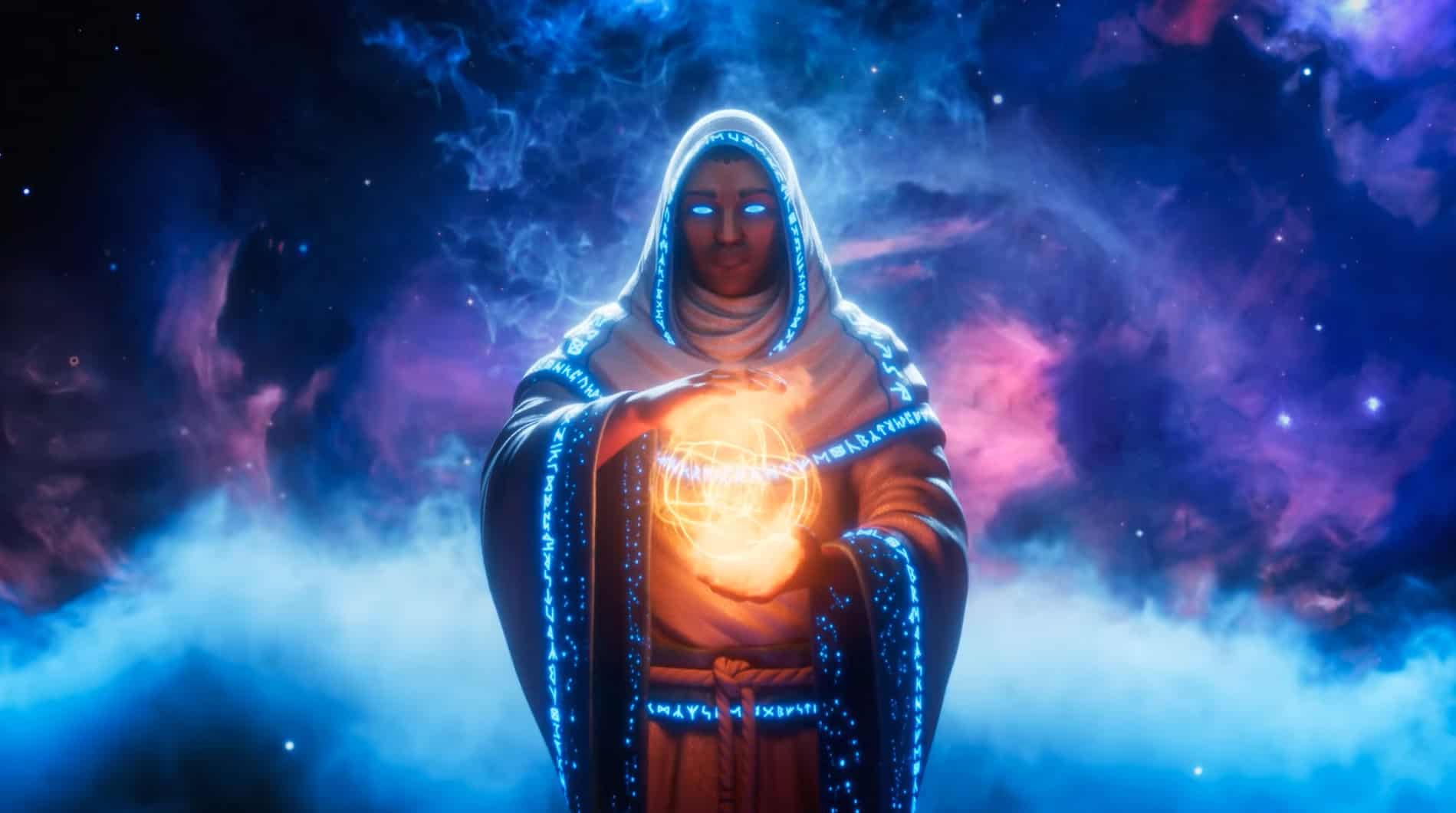
Gods Unchained is a fun online TCG that puts the power and ownership back into the player’s hands. I love this concept as loyal players not only get ownership of their cards to sell and collect as they see fit. But also granted governance in the direction that the game takes. NFTs and online TCG is a match made in heaven that creates a fantastic gaming product if pulled off correctly.
I have enjoyed Gods Unchained since my early beginnings with the game. It’s a fun TCG that has expanded since its release in March 2021 to feature new mechanics and types of cards that lead to ever-changing gameplay, such as the Empower cards, a type of card you can upgrade by spending extra Mana Gems to gain the upper hand.
The art style for the cards is excellent, and each tribe of cards is interesting and varied to fit within the lore of Gods Unchained.
- You won’t want to invest in any other online TCG after playing Gods Unchained, as you have ownership and value for your card collection.
- The developers of the Gods Unchained made the lore feel authentic likely due to being ex-Riot employees.
- Server bugs can make finding a game frustrating, and the client Cache has to be cleared frequently for it to work.
- The “Free to play, not pay to win” motto is somewhat true as you will still get annihilated by players that have invested a lot into their decks.
The Begining of Your Mortal Adventure
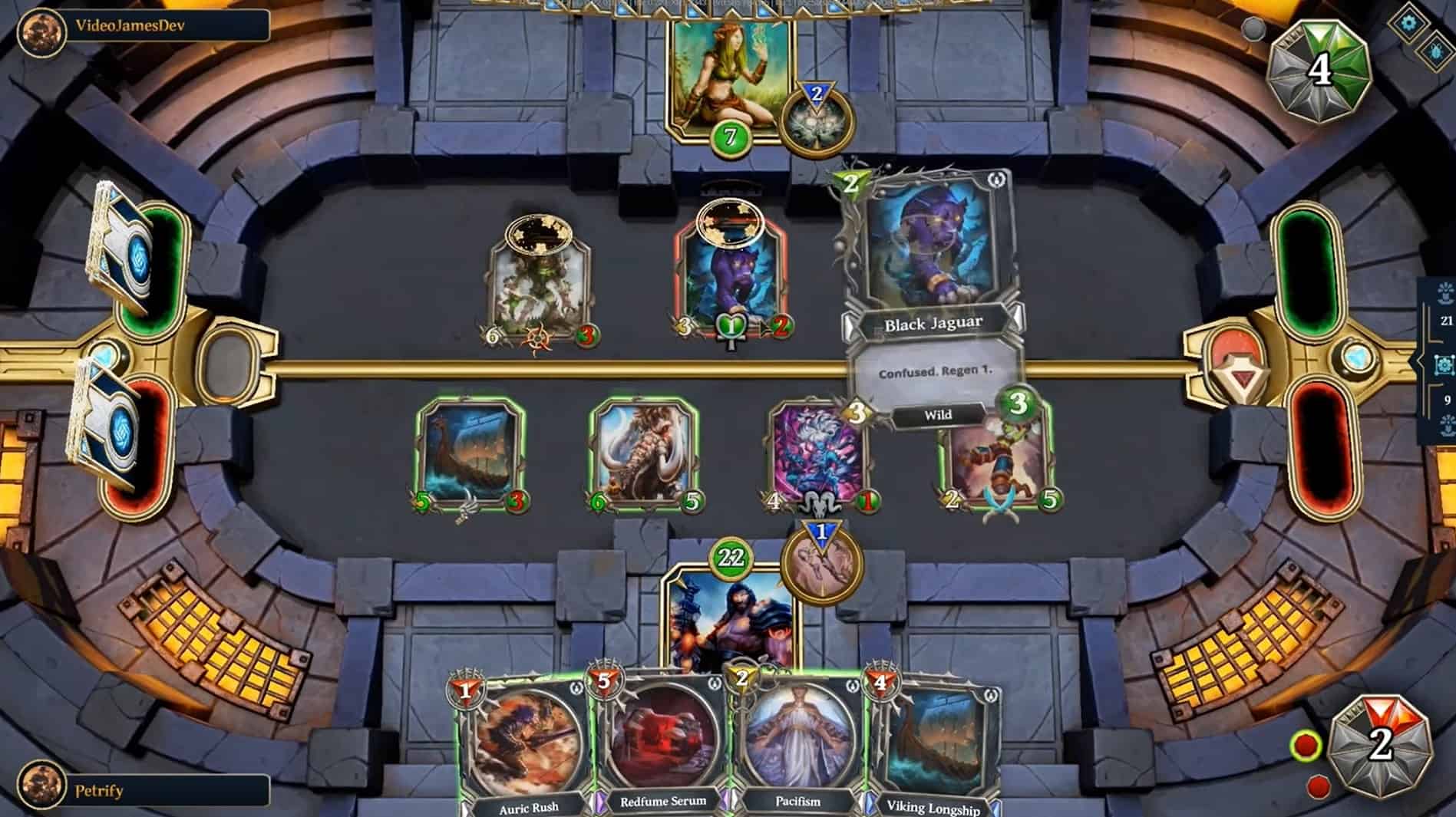
If you are a fan of Legends of Runeterra or Hearthstone, then you’re going to take to Gods Unchained like a fish in water. However, to play the game and set up your account, you must create a Metamask account and set up a wallet. The website does a great job of guiding you through this process. I recommend that you make a note of your secret recovery phase.
Naturally, trading cards are the main NFTs in Gods Unchained. The game will give you a set of core cards for each God as a reward for completing short tutorials. The tutorials are relatively short and lightly touch upon the gameplay mechanics but don’t explain many card effects, such as Leach, Order, and Empower. To keep up with the game updates, the developers are overhauling the tutorials by introducing new missions to learn how the game works. Completing these missions will reward you with card packs.
The Website Is My Bible
There is a lot of information for new players on the Gods Unchained website. However, I have noticed a few inaccuracies regarding abilities and features that are no longer present in the game. For example, the God Powers page is all wrong as each God only has three God Powers as of present, and many existing powers have been updated. Such as, the Soul Burn power initially dealt three damage to each God. Now it only deals one damage and costs one Mana Gem.
Despite this, I highly recommend you frequently browse the Gods Unchained website, as this is where all the latest news, updates, and lore are kept. This is also where you can redeem your $GODS tokens as a reward for participating in Weekend Ranked events and daily $GODS rewards when it comes to fruition.
Knowledge Is Power, But So Is Money
I spend a lot of time on the website, scrolling through blogs and articles regarding the story as I’m a big fantasy nerd. However, I wish the narrative could be implemented more fashionable way. Even so, I like how cards in expansion packs are themed around significant events in the story, such as the Trial of the Gods introducing the Champions.
The website is also where you can purchase new card packs. However, selling cards and purchasing individual cards are all done on the Immutable X website. I spend the other half of my time in the Gods Unchained client, as this is the place where card decks are created, card fusing takes place, and most importantly, where all the battles take place.
Whenever a game implements transactions within a game. It’s inevitable that some players are going to have more powerful cards than others. However, throwing money into Hearthstone will get you nothing in return. Investing in Gods Unchained allows you to hold on to your money. Its possible to play GU and earn cards without spending a penny. However, you won’t stand a chance against expensive decks.
Leveling up your Gods Unchained account will earn you free card packs.
- Earn a Rare Card Pack at every level.
- Earn an Epic Card Pack at every 10 levels.
- Earn a Legendary Card Pack at every 25 levels.
Furthermore, you will be able to earn additional free card packs by participating in the Weekend Ranked Events. Note that these cards will be plain quality and therefore not minted on the blockchain. However, you can Fuse these cards in the Forge to mint them into NFTs.
Six Gods Hundreds of Cards
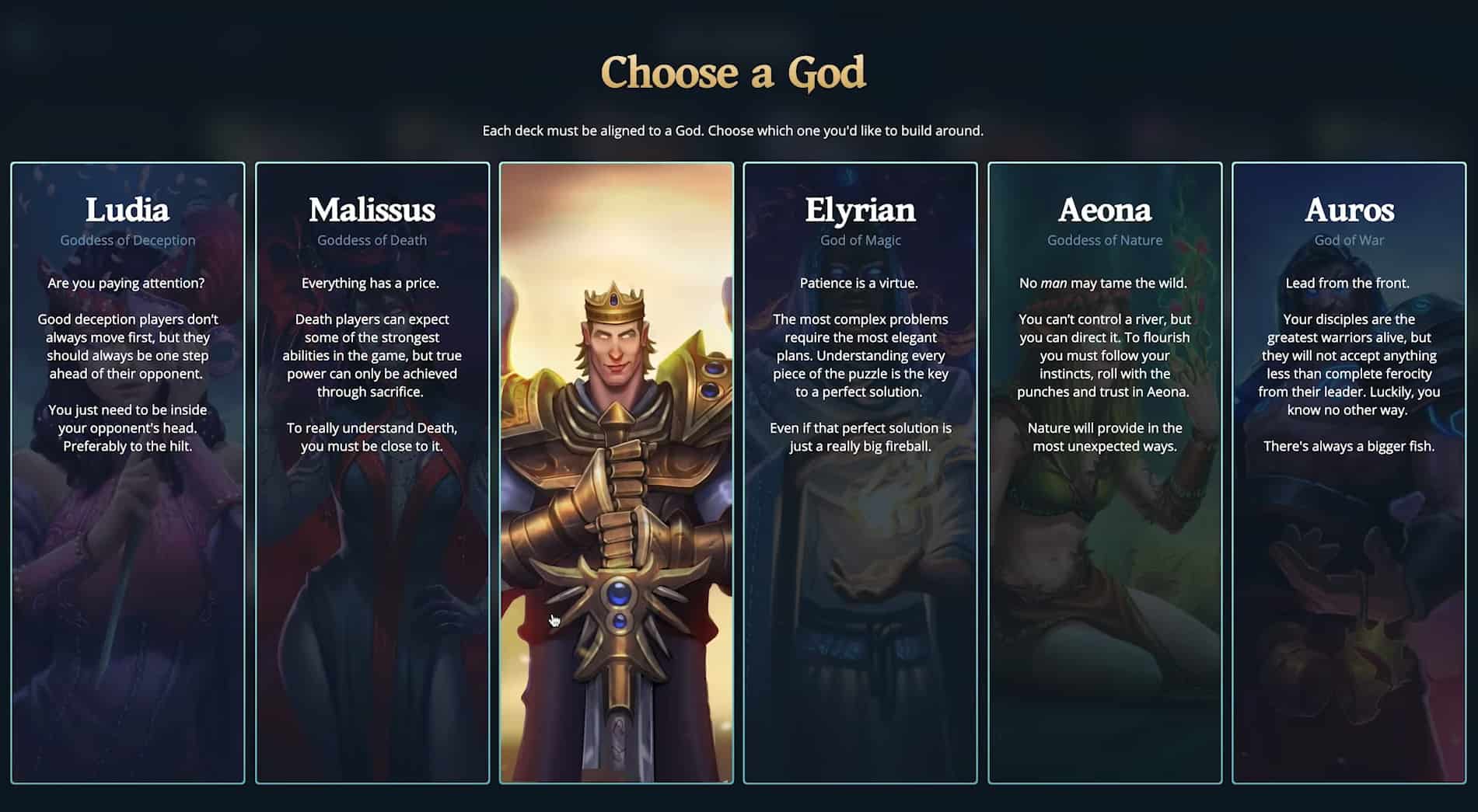
There are six Gods to pick and play that act as the game’s classes. Each God plays differently from the other. For example, Malissus, the God of Death, can raise creatures from the Void (the game’s name for the graveyard) back to her hand or board. Meanwhile, Aeona, the God of Nature’s Void, is cleared every few turns.
A God can exclusively use some cards; you can tell what domain a card belongs to by its color. There are six Gods in total to play.
- Auros – The God of War.
- Aeona – God of Nature.
- Malissus – God of Death.
- Thaeriel – God of Light.
- Elyrian – God of Magic.
- Ludia – God of Deception.
Death, Nature, and War are my favorites to play, with Death my most used God. I focused on one God to build a powerful deck, but the game does encourage you to play all six Gods with the Gauntlet of the Gods Flux rewards. The Gauntlet is a circular diagram with the six God icons placed around it. The player can win up to three matches before moving on to the next God. Each victory increases the amount of Flux rewarded.
The Favor System Is in Your Favor
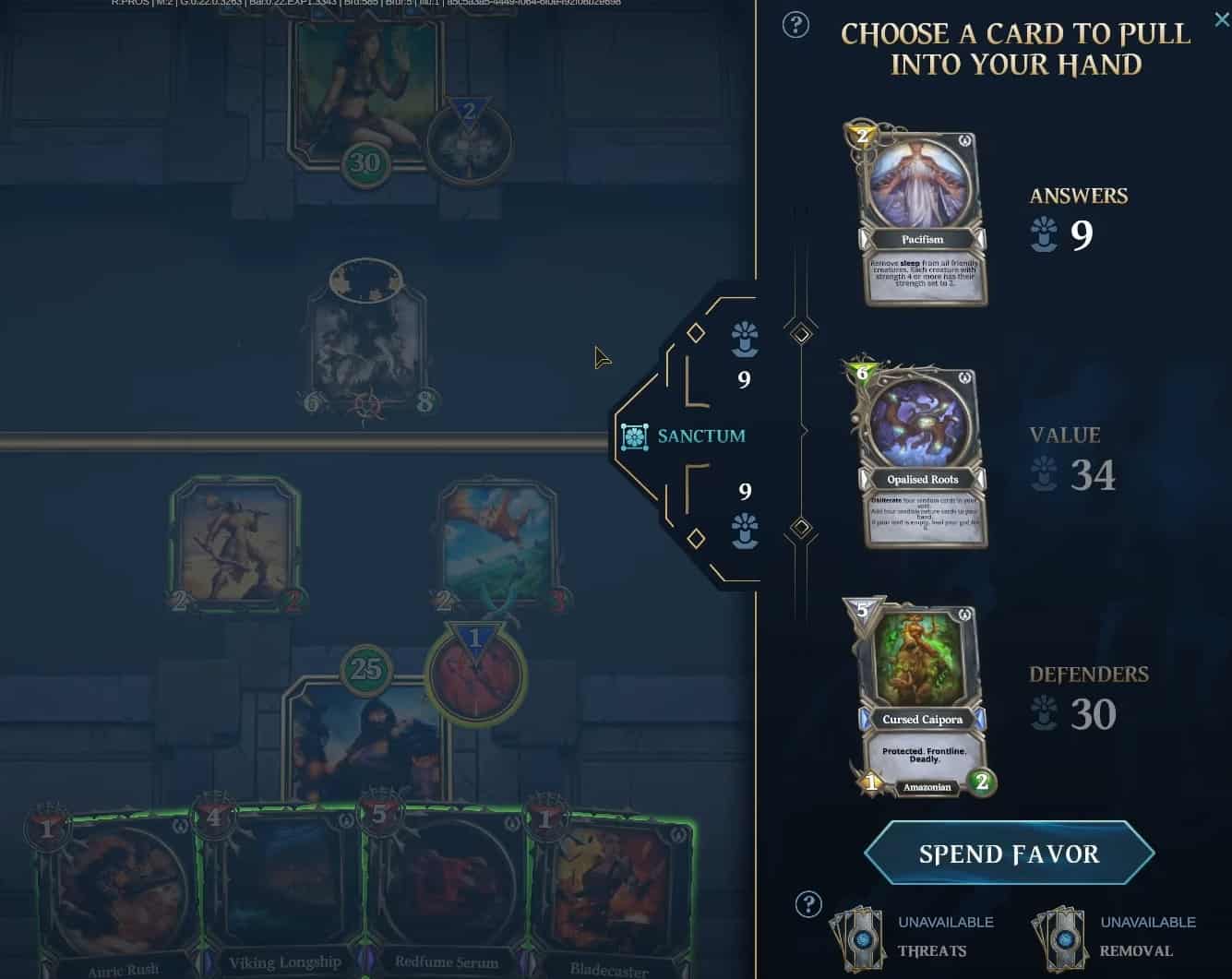
If you’re a long-time fan of TCG, then you will recognize many of the mechanics in Gods Unchained. However, the game isn’t just a cookie-cutter TCG with NFTs slapped on top. Gods Unchained features a Favor system where you gain Favor points by dealing damage to the enemy God and defeating enemy creatures. These points can be spent in the Sanctum to purchase cards to be added to your hand.
Some cards can increase your Favor, decrease your opponents, and even raise or lower the cost of cards in the Sanctum. Favor can sometimes be unfair. If one player has a lot of control or removal, they can quickly rack up Favor. Moreover, as an avid Death player, I have one deck that revolves around overwhelming the enemy with zombies. However, I can shoot myself in the foot doing this because my opponent gains a lot of Favor by destroying my zombie cards.
Scratching Your Head at Flux, Stars, and $GODS
Winning a match earns you Flux, a currency that can be used alongside $GODS to fuse identical cards together to create a more valuable version. This allows the developers to keep introducing common and basic cards without the economy becoming over-saturated, as cards are burned in the fusing process.
- This incentivizes the player to play Gods they wouldn’t usually play. As well as fuse cards to gain more valuable versions.
When I first started playing Gods Unchained, I was overwhelmed with the terminology Flux. Star? $GODS, what does it all mean?
The answer is a lot simpler than you think. When I began my mortal journey in Gods Unchained, Fusing was yet to be implemented into the game. Even so, Flux alongside Stars was awarded for winning games. Stars are a separate currency solely used to purchase cards in the Star Store.
The Star Store features four deals varying in price and time offered. I highly recommend checking the Star Store daily for updates, as this is a great way to obtain cards for free. The amount of Stars earned from winning matches decreases with each victory per day.
- Daily Deal – A common card of Plain quality costs 1,000 Stars.
- Welcome, Deal – A common card of Meteorite quality costs 1,800 Stars.
- Weekly Deal – A rare card of Plain quality costs 7,500 Stars.
- Welcome Shadow – A common card of Shadow quality costs 12,500 Stars.
Gods Unchained: Gameplay
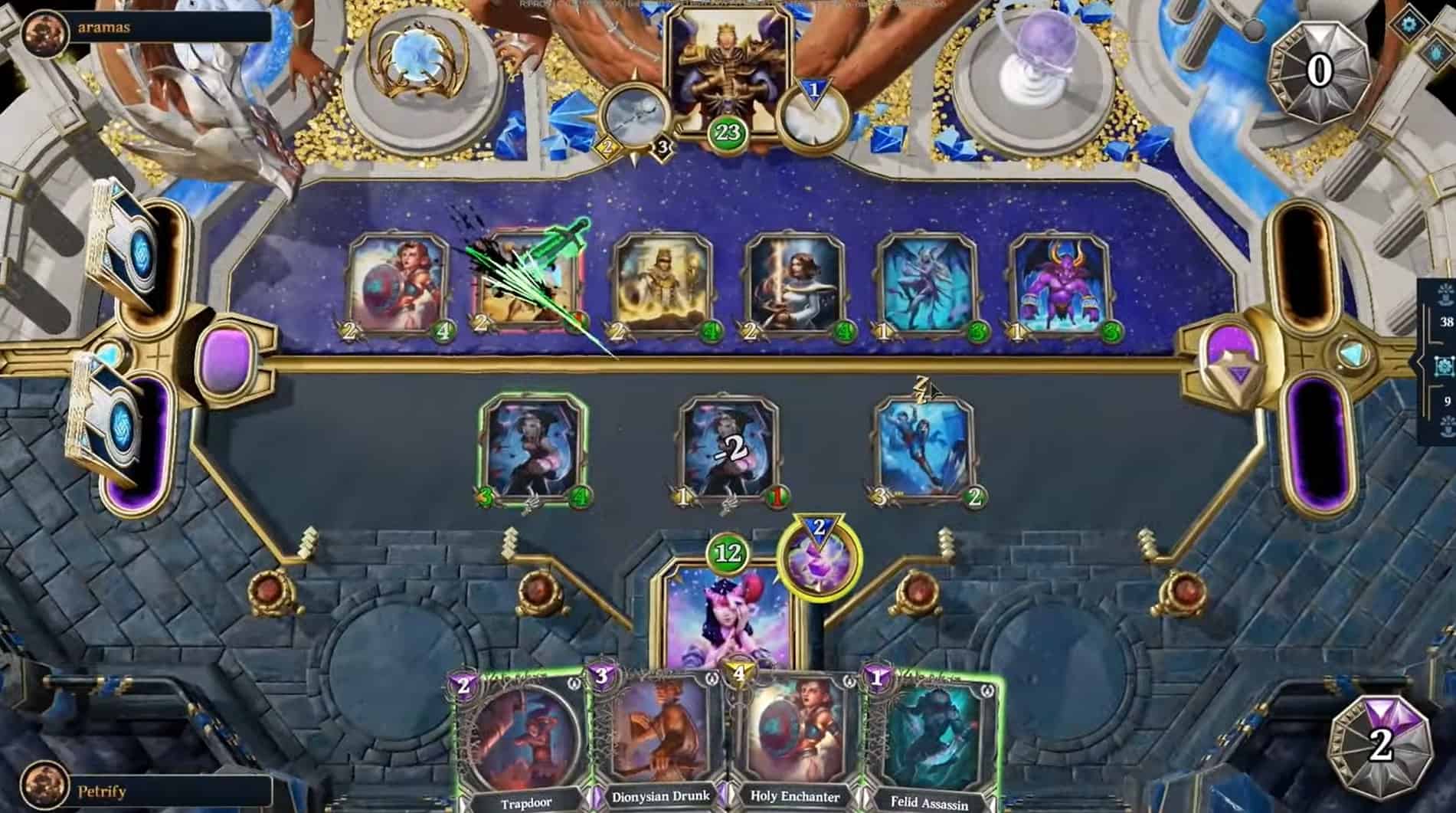
The Gods Unchained client is where all the fun happens. Unfortunately, there aren’t many game modes available. The game is limited to a Ranked Mode, the standard mode of play, Direct Challenge, where you can input a code to challenge a specific player like a friend, and Solo Mode, where you can practice your new decks against a computer.
Here are the twelve ranks of Gods Unchained, from the lowest to the highest:
- Rusted Bronze.
- Purified Bronze.
- Rusted Iron.
- Purified Iron.
- Impact Meteorite.
- Astral Meteorite.
- Twilight Shadow.
- Midnight Shadow.
- Auric Gold.
- Solar Gold.
- Ethereal Diamond.
- Mythic.
Each Gods Unchained match starts with the player choosing their God Power, then reviewing a small hand of cards. After replacing any cards, the game starts, and each player begins with one Mana Gem. The player that turns first will be given an extra Mana Pip, while the player who goes second will be given three Mana Pips to be activated throughout the match. These Mana Pips add an extra Mana Gem for a turn.
Players can use more powerful cards as they progress through turns. However, you won’t be able to win just by playing high Mana cost cards. You will need strategy and careful planning to beat your opponent. To win a match of Gods Unchained, you must deplete your opponent’s health to zero. Each God starts a game with thirty health.
God Powers Can Change a Game
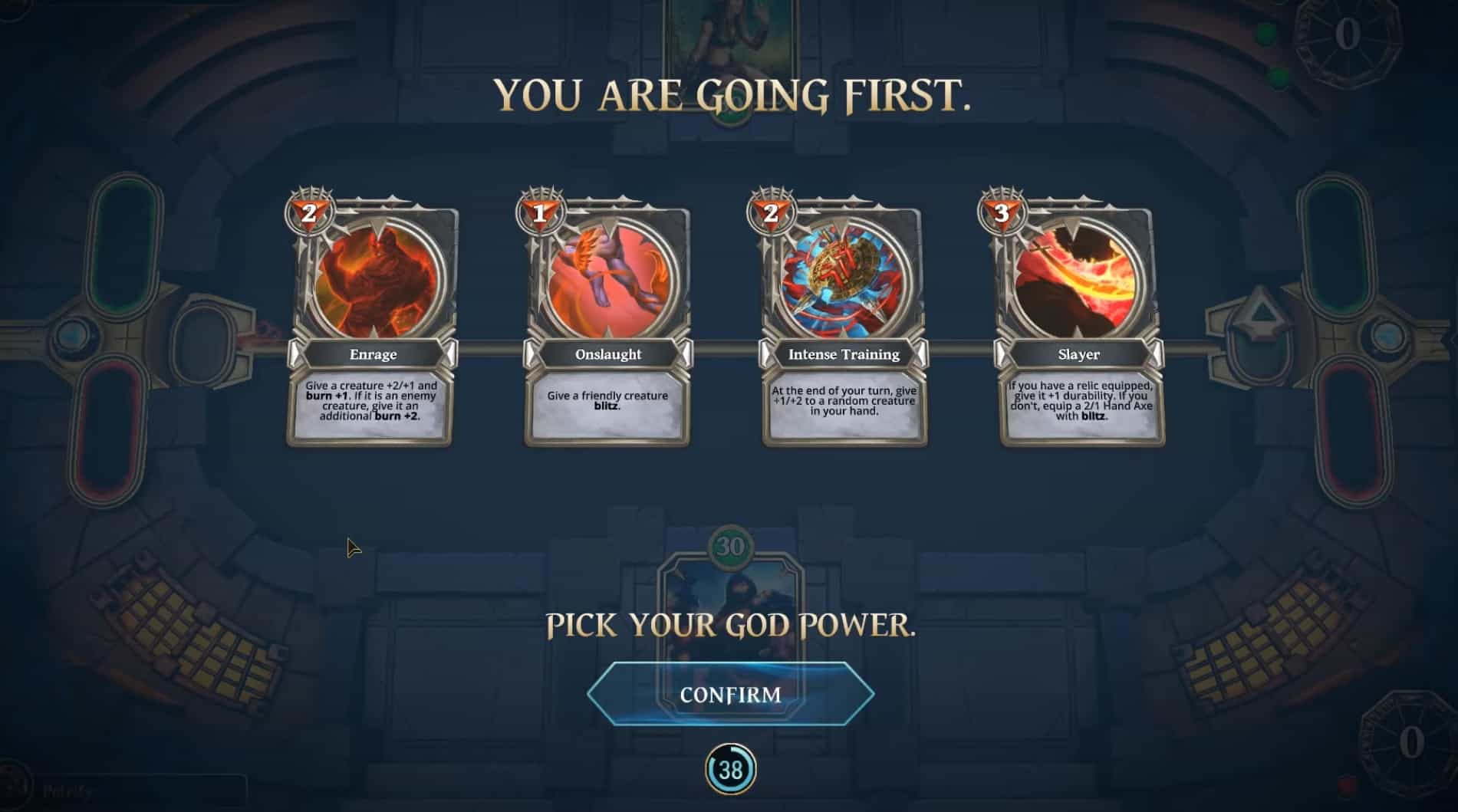
Like Hearthstone, your God will have an ability that can be activated every turn called God Power. At the start of each game, you will be given one of three abilities to choose from. These abilities are called God Powers and can significantly change how a God plays. For example, the God of Death has the choice of:
- Soul Burn – Deal one damage to both Gods.
- Blood Ritual – Destroy a creature with one health and heal your God for one point.
- Neferu’s Sacrifice – Draw a card and take two damage.
While the God of Nature is given:
- Flourish – Heal one of your creatures for one health point.
- Animal Bond – Summon a 1/2 Badger with Confused.
- Selena’s Mark – Deal one damage to a random enemy creature, heal your God for one point.
I always use Blood Ritual to finish off creatures if I play Death. Gosh, that was a cool sentence! It’s good to note that God Powers don’t all cost the same and vary between one Mana Gem to three Mana Gems. A low-cost God Power can Flourish, keep your creatures alive for longer, and can easily be activated on most turns while leaving many Mana Gems.
I was going to add every single God Power in the game in this section. However, that wouldn’t be useful, as the developers have added, updated, and even removed God Powers in the game. This can be due to balancing issues or even lore and story developments.
For example, each God had a God Power replaced after the Trial of the Gods expansion, based on each God’s Champion. For instance, Neferu’s Sacrifice is based on the God of Death champion Neferu. These champions feature in powerful cards as well as God Powers.
Over Twenty Keywords to Synergise
Many cards in the game have keywords attached to them. These keywords affect how a card is used in play, there are over twenty keywords in Gods Unchained, and the developers will likely add more with future expansions. Frontline is an excellent example of a keyword and is one of the most common keyword cards. Your opponent won’t be able to attack other characters until they have dealt with the Frontline.
. Some Gods specialize in using specific keywords. For example, Death makes the best use of Afterlife cards while Deception relies heavily on Hidden cards. You are not limited to these specific keywords and can experiment with all kinds of cards to create your perfect deck.
The Mortal Judgement expansion added three new keywords to the game:
- Echo – When played, a creature tied to the card is placed in your hand, costing one mana, strength, and health.
- Empower – Extra Mana Gems can empower these cards to make them stronger.
- Tempt Fate – One of the more exciting keywords, Tempt Fate, allows you to choose a safe buff for your card. Or gamble for a double buff with a chance of losing all buffs.
These are just three of the many keywords in Gods Unchained. As a Death main, my favorite keywords to play are:
- Afterlife – the card deploys an effect after its death and before it is sent to the Void, such as summoning a creature or adding a card to your hand.
- Frenzy – An effect occurs after damage has been dealt to the enemy God. I like Frenzy a lot as they vary a lot and can lead to summoning extra creatures and even increase the power of creatures. This allows me to snowball the enemy and apply more pressure.
- Leech – This is essential for Death decks that revolve around sacrificing health. Leech allows me to deal damage and heal my God simultaneously.
Playstyle is your personal preference; therefore, the keywords and Gods I enjoy playing may not be what you have fun playing with. For example, when I play Nature decks, I focus more on:
- Regen – Creatures with regen heal at the end of each turn.
- Overkill – Any leftover damage from destroying a creature is randomly dealt to enemy characters. I’ve found this very useful when overwhelmed with enemy creatures. It also allows me to target low-attacking enemies to ensure my creature minimizes damage.
- Confused – When attacking, these creatures have a 50% chance of striking a different enemy character. This may sound annoying initially, but it’s helpful in taking out creatures behind Frontlines. Subsequently, let me take out pesky Spell Damage cards used by Magic players.
Deck Building
Gods Unchained supplies you with starter decks for all six Gods in the game. These starter decks are great for learning the game’s mechanics. They will also help you get acquainted with how each God plays because Ranked is the primary mode in the game. You’ll come across tougher opponents as you rise in the ranks and win games. As a result, the starter decks became weak, and to stay competitive, I had to create new decks.
A deck is made up of thirty cards, and it’s generally a good idea to build a deck with a higher number of lower-cost cards than higher cards. However, this depends significantly on the type of deck you want to develop and your strategy. The Workshop is laid out well, and it’s easy to filter through cards.
Gods Unchained features an import card deck feature. If deck building isn’t really your thing. Or you want to copy a deck that you’ve seen online. However, you will have to own all cards in the deck for this to work. I highly recommend that you experiment with each God as you’ll learn how to counter them and earn more Flux in the Gauntlet.
That said, the game gets very competitive at higher ranks. Midnight Shadow is the highest rank I’ve reached, and it gets incredibly competitive. After achieving this rank, I had a break from the game. After returning to the game, I noticed a significant increase in challenge. As the meta had changed, my deck could barely hold a candle to my opponents.
Card Breakdown
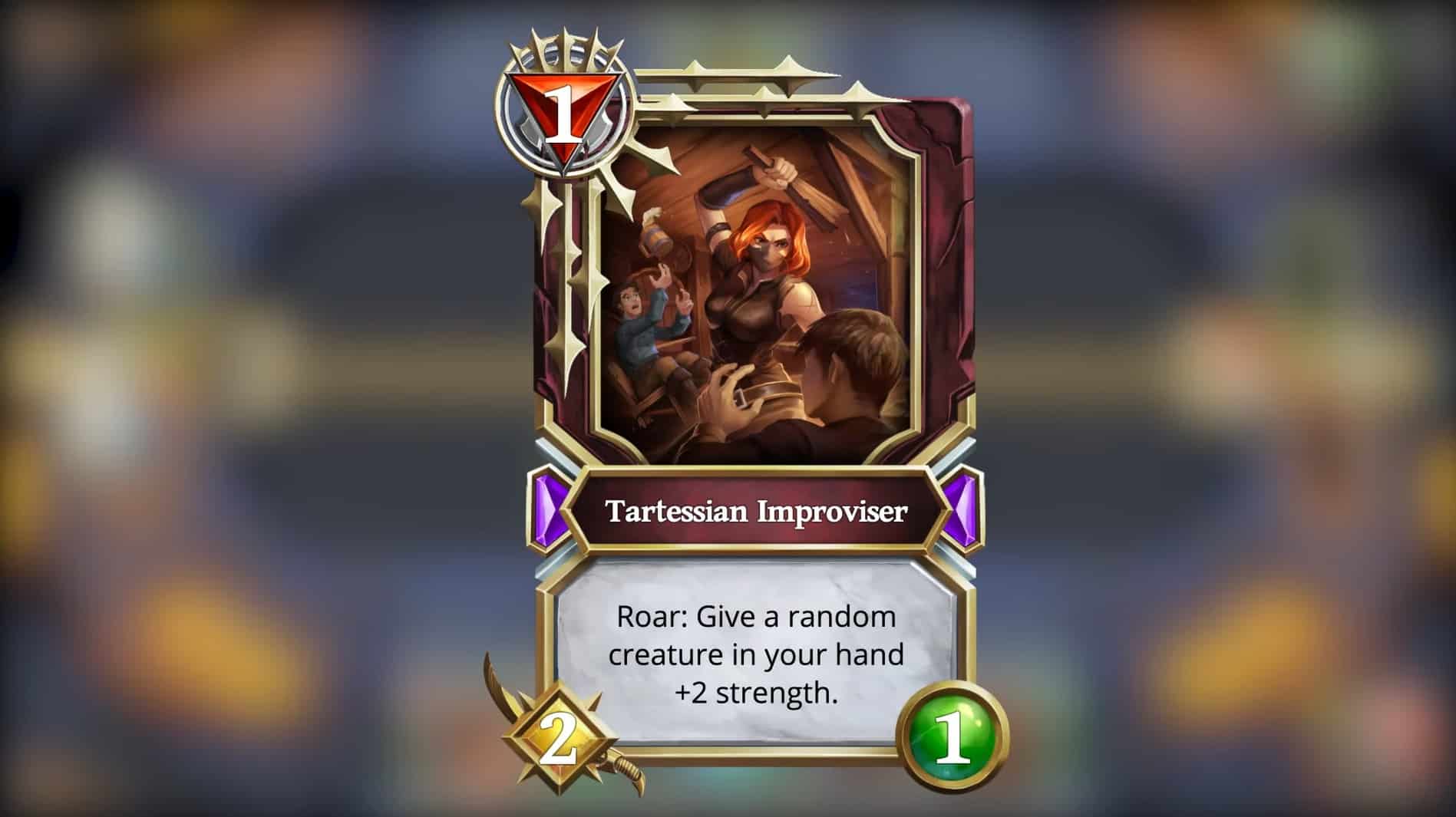
Cards are everything in Gods Unchained, and all contribute to the prosperous economy. Some cards are worth peanuts, while others are worth more than my car. I guess a 2008 rusty Ford Fiesta isn’t worth that much; it’s priceless to me, though. Some of the Gods Unchained are worth a silly amount of money.
Each card has a rarity and quality to it that determines its worth. As the term suggests, rarity highlights its drop rate from packs. The rarer the card, the less likely it is to drop, as there is a lower supply of these cards. Cards can have the following rarity from the lowest to the highest:
- Common
- Rare
- Epic
- Legendary
- Mythic
Quality is not to be confused with rarity. Is the card’s value, you can improve the quality of a card by fusing multiple cards of the same quality together:
- Meteorite
- Shadow
- Gold
- Diamond
Core Cards
I think this shows that the game is ever-changing and evolving. This is great as this keeps the game fresh. I gave the game a break, frustrated with overpowered Magic decks. On my return, I was pleasantly surprised to see that Magic had been nerfed. Interestingly because cards are NFTs minted on the blockchain, the developers cannot nerf or change the value of cards.
Gods Unchained features core cards not minted on the Ethereum blockchain. These cards can be updated and nerfed as the developers see fit. Starter decks are made up of core cards, allowing them to stay relevant as the game changes. There is a lot of transparency with core card updates, as shown in the Core Set Refresh blog post on the Gods Unchained website, which both updated cards and added new core cards.
Expansions
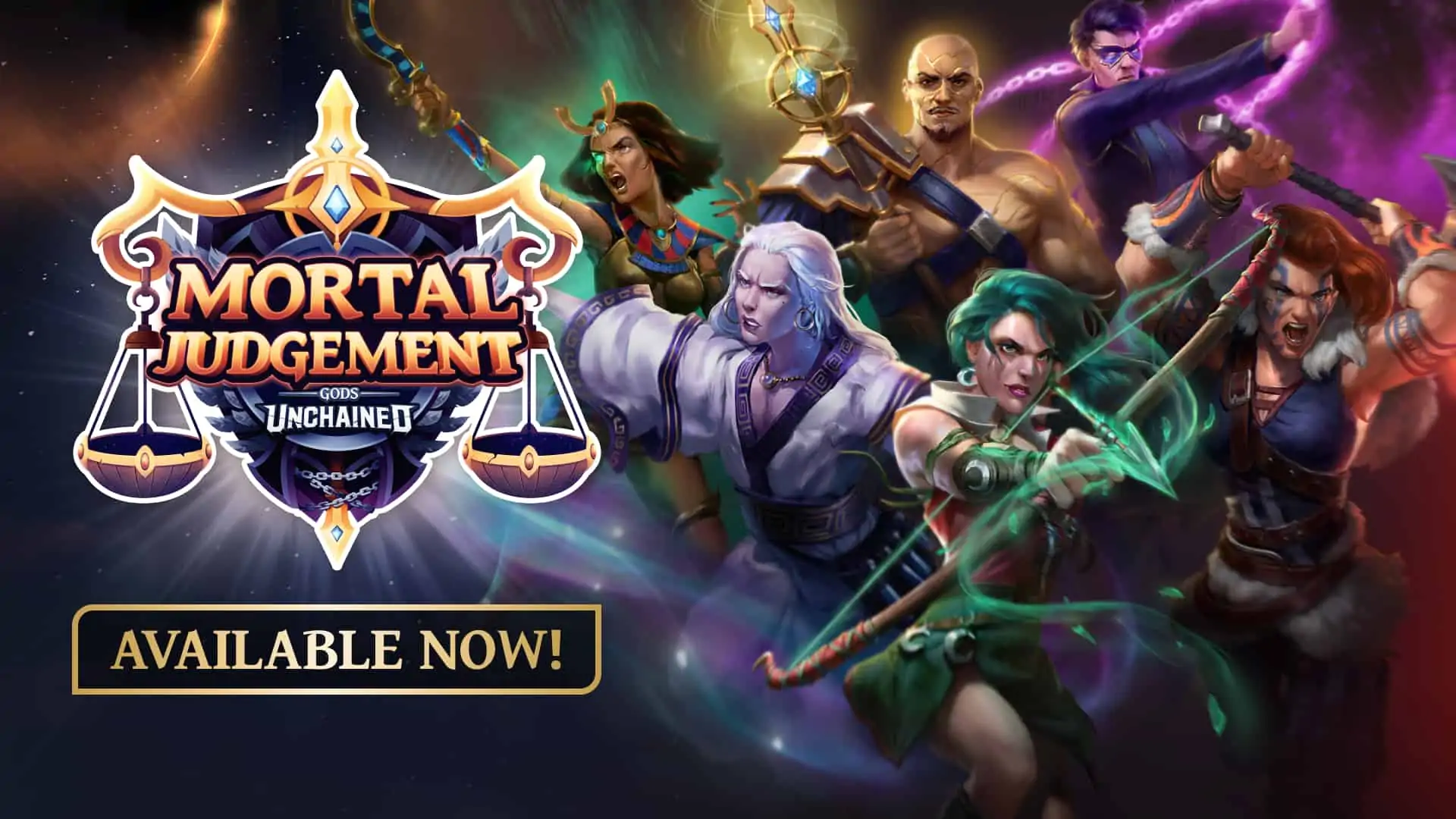
Sets are groups of cards that have been released in expansions. Each card has a little icon in the top right corner showing which set it belongs to. It’s a good idea to filter through sets to find cards that will synergize well with your deck. Gods Unchained is in season one right now, and multiple expansions have been released for the game:
- Trial of the Gods
- Divine Order
- Mortal Judgement
Each set is released into Gods Unchained unlocked for a certain amount of time. This allows the developers to rebalance issues with cards and fix any problems. The set is then locked after the appropriate changes and updates have been made. This means that the cards in the set can never be altered again, meaning the Takhat Priestess card I own will be the same forever.
You must be careful when purchasing unlocked cards as an overpowered or frequently used card may fall out of meta and use after its nerf. In turn, this will decrease its value, and you will be left with a card that is worth very little.
Immutable X Store
The Immutable Store is where you can browse minted cards listed for sale by other players. You can also view all your assets and list cards on the market. To purchase and sell cards, you must have your MetaMask wallet linked with your Gods Unchained account.
I have a few qualms with the Immutable Store, none bigger than its poor searching filters. I think it’s very easy for players to be misled into buying a card a lot higher than it’s worth. While it could be argued this is the buyer’s responsibility, it can be challenging to sift through hundreds of cards to find a good price, as some cards have been listed with an unbelievable price.
Therefore I use websites such as gudecks, TokenTrove, and Aqua as these are official websites tide to Immutable and give a good insight into the value of cards by not only showing how often they are used and the supply of the cards. But also every listing of the card on the marketplace. This allows you to compare the prices of cards and not purchase a card for way more than its worth.
FAQs
Question: Are There Crypto TCG Alternatives to Gods Unchained?
Answer: Gods Unchained is by far the most successful crypto TCG available to play. However, Splinterlands is another crypto TCG on both PC and Mobile. It’s free to play, excluding the Spellbook, an item used to store your cards. It’s worth a try if you enjoy TCGs and waiting for the Gods Unchained mobile version to release.
Question: Is Gods Unchained Competetive?
Answer: Gods Unchained is a competitive game with a small esports scene. The game is fundamentally competitive, with Ranked Mode being the primary play mode. The developers are dedicated to growing the esports scene as Gods Unchained is now compatible with the CardBoard.Live extension for Twitch that allows spectators to interact with the game. Moreover, the ongoing Community Clash event is a community tournament that will enable players to participate and have the chance to win a cash prize and card packs, of course.
Question: How Can I Earn More $GODS Tokens in Gods Unchained?
Answer: The more $GODS you hold in your Immutable wallet, the more $GODS you will earn from the weekly Offering of the Gods rewards. To be eligible for the Offering of the Gods, you must hold $GODS in your Immutable wallet and link your account with Gods Unchained and meet at least one of the following criteria:
• Play at least one game in GU.
• Create one NFT via the forge.
• Purchase an expansion pack during the reward period.
• Purchase or sell a card on the Immutable X marketplace.
Final Thoughts
In conclusion, Gods Unchained is a fun online TCG built on the Ethereum blockchain. The game puts the power of ownership into the player’s hands. Ignoring the crypto side of Gods Unchained, I ask myself if I would still play this game without ownership of the cards. The answer is yes, I would. I’m a sucker for a good story, and Kelly Digges and the developers have done a fantastic job of creating an exciting universe with excellent dynamics between reminiscent factions and the Gods.
I like how the cards aren’t just random shiny collectibles but instead have narrative power behind them. As many cards give hints to major characters, such as Neferu’s Will and Council of the Gods cards. I had a blast reading the story on the Gods Unchained website. However, I’m left wanting more, and perhaps the narrative could be included in the game somehow.
Bringing crypto back into the equation and I think the developers are well on their way to creating something revolutionary in the TCG genre. Yes, it’s nice to have value in your cards, and the PTE (Play To Earn) concept is excellent. As it gets you more invested in the game for longer. But I think player governance is one of the best reasons to get involved with Gods Unchained.
I feel way more invested in Gods Unchained as a blockchain game. The art is spectacular, and the game doesn’t feel like a poorly coded browser game. Even if you’re not interested in games, you would be impressed with what the developers have built.
For more interesting reading check out:

